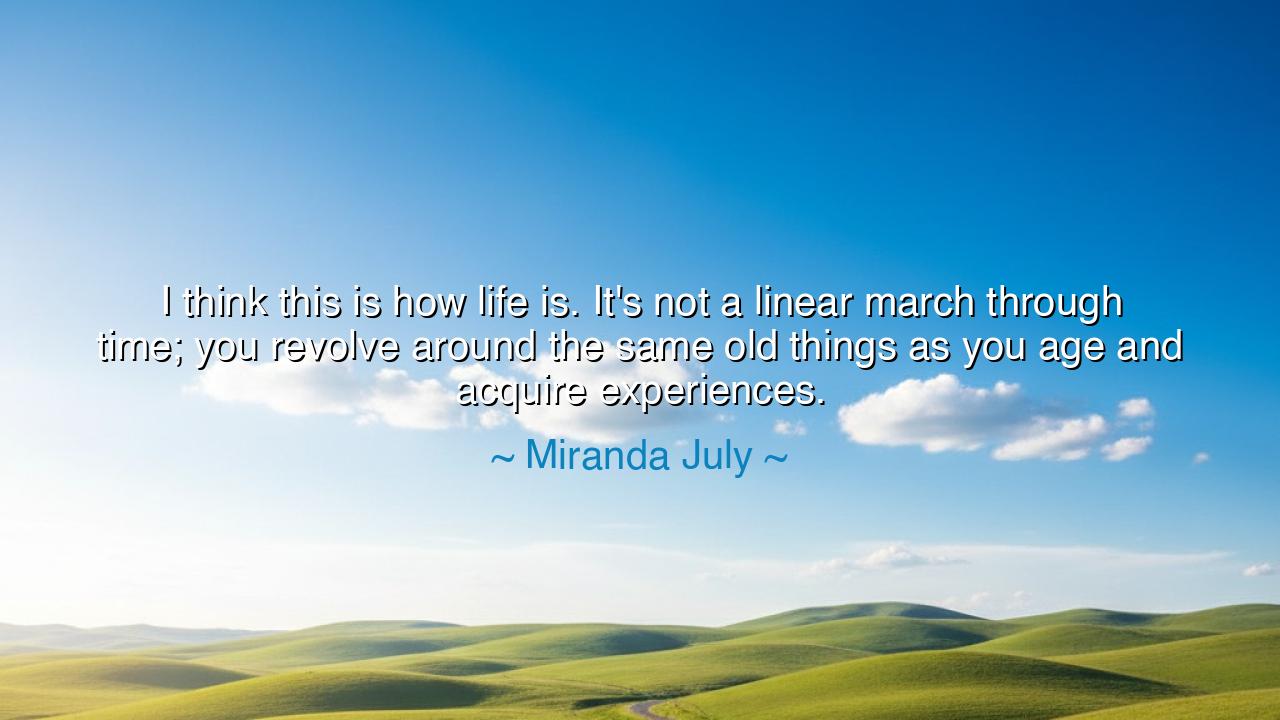
I think this is how life is. It's not a linear march through
I think this is how life is. It's not a linear march through time; you revolve around the same old things as you age and acquire experiences.






The artist and storyteller Miranda July, known for weaving truth through strangeness and tenderness, once said: “I think this is how life is. It’s not a linear march through time; you revolve around the same old things as you age and acquire experiences.” In this reflection lies a deep understanding of the human journey — that life is not a straight road, but a circle, ever turning, ever returning. What we call growth is not the abandonment of the past, but the revisiting of it with wiser eyes. The soul does not walk away from what shaped it; it walks around it, seeing new patterns in familiar constellations.
The origin of this quote comes from July’s own contemplative approach to art and existence. As a filmmaker, writer, and performer, she often explores the quiet repetitions of life — the ways people rediscover the same emotions, fears, and longings at every stage of being. Her insight is born not of cynicism, but of reverence: the understanding that human experience, like the moon, waxes and wanes, but always returns. Life is cyclical, not mechanical; it breathes in seasons, not straight lines. We do not move forward as soldiers on a march — we move in spirals, ascending perhaps, but always touching the echoes of what came before.
There is a sacred rhythm in this. The ancients knew it well — they saw the heavens turning in circles, the tides ebbing and flowing, the harvests dying only to rise again. To them, time was a wheel, not a calendar. Miranda July’s words awaken that same ancient wisdom in modern form: that to live is to return, again and again, to the same truths, the same loves, the same questions, each time transformed by the weight and light of new experience. It is not stagnation to revisit the past; it is continuity — the thread that binds all our selves together across the years.
Consider the story of Vincent van Gogh, who throughout his short life painted fields, faces, and skies over and over again — never content with a single vision. The sunflowers, the stars, the wheatfields — he painted them not because he lacked new ideas, but because he was orbiting the same mysteries, seeing them anew through changing eyes. The more he painted them, the more truth he saw, not in their novelty, but in their familiarity. So too does the human heart return to the same loves, the same pains, the same dreams — but each return is deeper, richer, more knowing. For as Miranda July says, we revolve, not regress.
This truth also humbles the restless soul that seeks constant novelty. The modern mind is obsessed with progress — with forward motion, with the idea that meaning lies only in what’s next. But the wise know that the present is not a stepping stone, it is the sacred ground itself. Growth is not measured by how far one travels from the past, but by how deeply one understands it. To revisit an old memory, to feel an old sorrow with new compassion — this, too,






AAdministratorAdministrator
Welcome, honored guests. Please leave a comment, we will respond soon